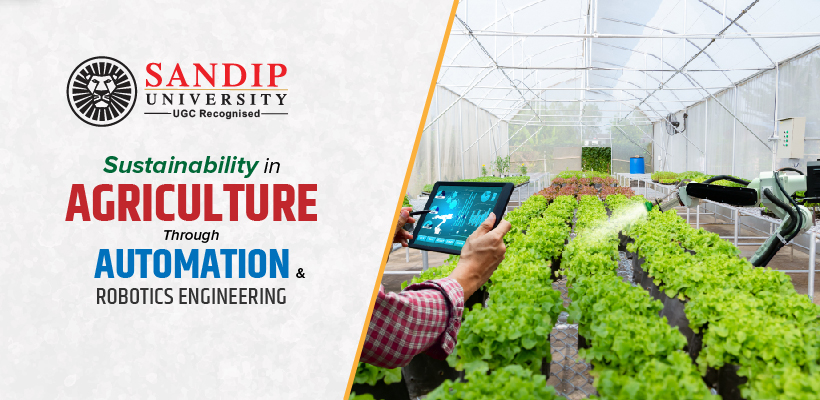In the ever-evolving world of technology, automation and robotics engineering have emerged as transformative forces, reshaping industries and redefining possibilities. One sector that stands to gain immensely from these innovations is agriculture. Faced with challenges such as climate change, labor shortages, and the growing demand for food, the agricultural industry is turning to automation and robotics to ensure efficiency, sustainability, and productivity.
Some of the best engineering colleges in Nashik are offering futuristic programs in automation and robotics engineering to facilitate future advancements in these fields by training next generation engineers. In a world where efficiency and sustainability are paramount, automation and robotics engineering are more than just tools, they are catalysts for transformation. By leveraging these technologies, we can ensure that agriculture thrives in harmony with our planet, feeding the world while safeguarding its resources for generations to come.
Let us explore the rise of smart farming, advancements in this field, sustainability, challenges, and the road ahead for the integration of automation and robotics into agriculture:
The Rise of Smart Farming
Gone are the days when agriculture was solely reliant on manual labor and traditional techniques. Today, smart farming is leading the charge, incorporating technologies such as artificial intelligence (AI), machine learning, and IoT-enabled sensors to optimise agricultural practices. Robotics and automation are at the heart of this revolution, delivering precision and scalability that were once unimaginable.
Key advancements include:
- Automated Harvesting Systems: Robots equipped with advanced vision systems can identify ripe fruits and vegetables, reducing waste and increasing yield.
- Drone Technology: Drones are revolutionising crop monitoring, enabling real-time analysis of soil conditions, pest infestations, and plant health.
- Self-Driving Tractors: Autonomous vehicles can perform plowing, planting, and fertilising tasks with pinpoint accuracy, reducing resource usage.
Efficiency Through Precision
Robotics engineering brings a level of precision that is crucial for sustainable farming. Unlike traditional methods, automated systems can:
- Reduce Resource Wastage: Sensors and algorithms ensure water, fertiliser, and pesticides are applied only where needed, minimising environmental impact.
- Boost Productivity: Robots can operate 24/7, overcoming labor shortages and speeding up tasks such as planting and harvesting.
- Enhance Quality Control: AI-powered sorting systems ensure only the best produce reaches the market, improving profitability for farmers.
Sustainability at the Core
Agriculture’s shift towards automation is not just about efficiency; it’s about building a more sustainable future. Robotics engineering helps tackle pressing environmental issues by:
- Lowering Carbon Footprints: Autonomous machines powered by renewable energy sources reduce reliance on fossil fuels.
- Promoting Soil Health: Precision agriculture prevents over-farming and soil degradation, ensuring long-term fertility.
- Reducing Food Waste: Accurate harvesting techniques and optimised storage conditions lead to less spoilage and waste.
Challenges and Opportunities
While the integration of robotics in agriculture holds immense promise, it comes with challenges:
- Cost Barriers: High upfront investment in automated systems can deter small-scale farmers.
- Skill Gaps: Farmers must acquire technical knowledge to manage and maintain advanced systems.
- Data Security: The reliance on digital platforms raises concerns about data privacy and cyber threats.
However, these hurdles also present opportunities for innovation. Governments, tech companies, and educational institutions can collaborate to make automation accessible, provide training, and develop secure solutions for the agricultural sector.
The Road Ahead
The future of agriculture lies in embracing robotics and automation, which promise to address global food security challenges while preserving natural resources. By combining engineering excellence with ecological responsibility, this technological shift is paving the way for a greener, more prosperous future.
As robotics engineers and agricultural innovators continue to work hand-in-hand, the vision of a world where farming is efficient, sustainable, and resilient is steadily becoming a reality. Whether it’s through AI-guided tractors or robotic pollinators, the possibilities are endless. Automation in agriculture isn’t just a trend; it’s the foundation of tomorrow’s farming.
Conclusion
Automation and robotics engineering are ushering in a transformative era for agriculture, blending precision, efficiency, and sustainability to meet the growing global demand for food. From self-driving tractors to AI-driven crop monitoring, these technologies are reshaping traditional farming practices, enhancing productivity, and reducing environmental impact. While challenges like cost and technical expertise remain, ongoing innovation and collaboration among governments, industries, and academia are making these solutions more accessible.
Engineers holding qualifications from some of the top engineering colleges in Maharashtra are paving the way towards advancements in agricultural science with the use of automation and robotics. By embracing automation and robotics, agriculture can evolve into a future-ready sector such as feeding the world sustainably, conserving resources, and safeguarding the planet for generations to come. The integration of technology into farming isn’t just a revolution; it’s the foundation for a resilient and sustainable agricultural future.

